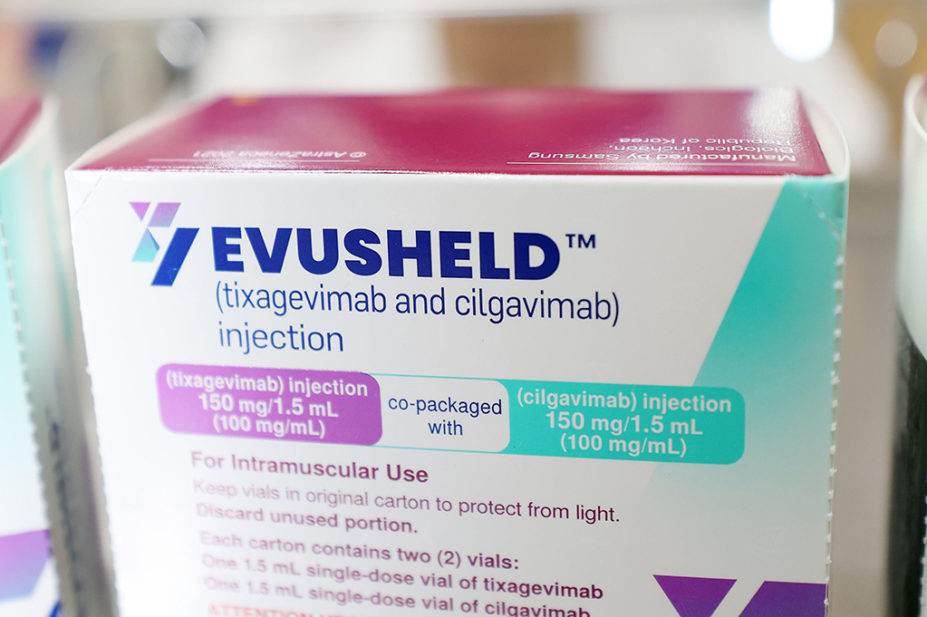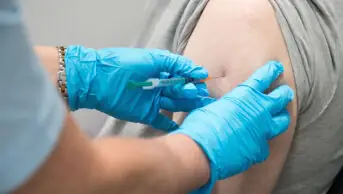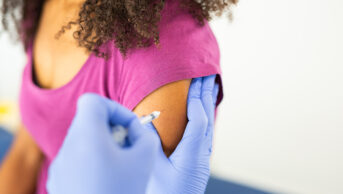
Newscom / Alamy Stock Photo
The UK government has said it will not purchase any doses of the COVID-19 monoclonal antibody cocktail Evusheld (tixagevimab + cilgavimab; AstraZeneca) owing to a lack of data on the level of protection it offers.
Evusheld is a combination of two monoclonal antibodies — tixagevimab and cilgavimab — and works by binding to the spike protein of the SARS-CoV-2 virus, preventing it from attaching and entering human cells.
In March 2022, it became the first pre-exposure prophylaxis to be approved by the Medicines and Healthcare products Regulatory Agency for the prevention of COVID-19 infection in adults who are unlikely to mount an immune response from COVID-19 vaccination or for whom vaccination is not recommended.
The Pharmaceutical Journal revealed in May 2022 that the government planned to assess the medicine’s effectiveness before it committed to any purchase.
However, on 12 August 2022, a spokesperson for the government said: “Our clinical experts advise there is currently insufficient data on the duration of protection offered by Evusheld in relation to the Omicron variant and the government will not be procuring any doses at this time.
“We are determined to support the most vulnerable as we live with COVID-19, and immunocompromised patients are a priority for other treatments, access to free tests and vaccination.
“We continue to explore the market for promising treatments that could prevent infection, to add to the antibody and antiviral treatments that are already offered on the NHS.”
Trial results have suggested that Evusheld reduced the risk of developing symptomatic COVID-19 by 77%, with protection continuing for at least six months following a single dose.
However, these trials were carried out from November 2020, before the emergence of the BA.2 Omicron subvariant in February 2022, leading the UK Health Security Agency to conduct lab testing to ascertain effectiveness and length of protection provided against both BA.1 and BA.2 subvariants.
Commenting on the government’s decision, Jonathan Blades, head of campaigns and external relations at the Multiple Sclerosis (MS) Society, said: “[It is] deeply concerning that the government has decided not to immediately offer the COVID-19 preventative treatment, Evusheld, to those who are immunocompromised.
“As we head into autumn and winter, over 500,000 people — including many with MS — remain extremely vulnerable to the virus, even after vaccination.
“Yet having one dose of Evusheld, which has been found to provide long-lasting protection against COVID-19 for up to six months, could significantly reduce people’s risk of hospitalisation as the virus circulates through the winter,” he said.
“Our government must follow their lead in prioritising vulnerable people. For all other pandemic-related measures, like vaccines and antivirals, the government has acted swiftly and decisively to ensure the UK has a supply, but handed an opportunity to act for those most vulnerable to COVID-19 they have slowed to a crawl.
“Until the treatment is made available, people with weakened immune systems remain cruelly in limbo.”
Henny Braund, chief executive officer at blood cancer charity Anthony Nolan, said it was urging the government “to rethink its decision”.
“Those at higher risk, including blood cancer patients, deserve to know why Evusheld, a drug manufactured by a British company, is not available in the UK, yet can be accessed in over 32 countries around the world. We are concerned at the government’s lack of transparency and its vague reference to data,” she said.
“This is a huge blow for immunocompromised people up and down the country who are still shielding, isolated from the rest of society, more than two years after the start of the pandemic.”
On 28 July 2022, a group of charities including Blood Cancer UK, Anthony Nolan and the MS Society wrote an open letter to health secretary Steve Barclay calling on the government to make Evusheld available.
“A significant number of the people we represent garner only limited known benefits from vaccination. Many cancer patients, transplant recipients, people with primary and secondary immunodeficiency, and those on immunosuppressive medications, as just illustrative examples, remain extremely vulnerable to Covid, even after vaccination,” the letter said.
“Evusheld and drugs like it represent an important step forward for this group and must be considered as part of a broader strategy for living safely with COVID.”


